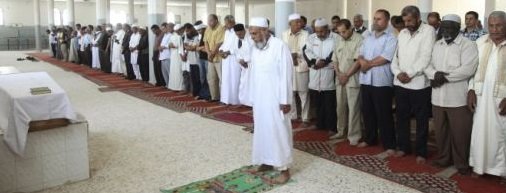Answered by Shaykh Yūsuf Badāt
Question:
Can you please clarify a ḥadīth I came across about debt? Something about the Prophet Muḥammad (peace and blessings upon him) not conducting the funeral prayers on someone who had debt. One of the Companions stepped in and payed the debt off. Only then was the funeral prayer offered.
Unfortunately, living here, the majority of us have debt such as car loans or mortgages. If someone passes away in the midst of this, do we still get a janāzah (funeral) prayer?
Answer:
Jazāk Allāh Khayr/ Thank you for your questions.
The initial practice of the Prophet Muḥammad (peace and blessings upon him) was to abstain from personally leading the funeral service of a person who had debts. This was to give a message to the masses that one should settle outstanding obligations such as debts as soon as possible. There were people who were trivializing the importance of settling debts. Therefore, initially the Prophet (peace and blessings upon him) would instruct others to lead the funeral prayer for the one who passed away while in debts. However, when the community understood the severity of unnecessary debts and or seriousness of paying off loans at the earliest, the Prophet then did lead the funeral prayers of such deceased persons despite their debt. (See: ‘Awn al Ma’būd and Mirqāt)
“If a believer died with debts outstanding, [initially,] the Messenger of Allāh (peace and blessings upon him) would ask whether he had left behind anything to pay off his debts. If they said yes, he would pray for him, but if they said no, he would say: “Pray for your companion.” Then, when Allāh facilitated the conquests [of Makkah etc. and the dynamics changed], he (peace and blessings upon him) said, “I am closer to the believers than their own-selves. Whoever dies and leaves behind a debt, I will pay it, and whoever leaves behind wealth, it is for his heirs.” (Nasa’ī)
“Taking a loan and being in debt is an islamicaly permissible act. The detestation of the Prophet (peace and blessings upon him) is against the deceased who had debt owing yet did not make arrangements for repayment [in a will or bequest] as the Prophet was concerned for the rights of people.” (‘Awn al Ma’būd)
“The initial practice of the Prophet (peace and blessings upon him) to decline performing funeral prayers for the one in debt was later abrogated.” (Targhīb li al Mundhirī)
After clarification of the above, kindly note that a funeral service for a Muslim who has passed away is wājib (mandatory). Regardless of whether the deceased has debt or not. It is however equally important to have proper documentation and arrangements related to the loans, in case one dies a sudden death. This way matters can be taken care of by family or friends after one’s passing. Also worthy to note is that believers should only take loans for necessary matters and also avoid islamically impermissible loans.
And Allāh Knows Best




